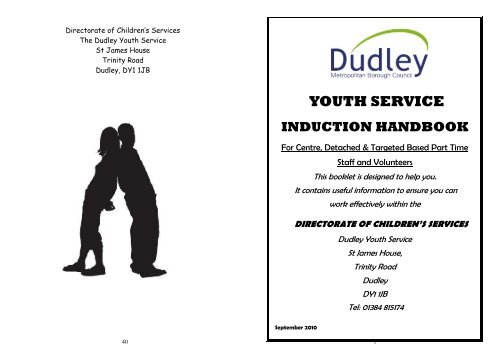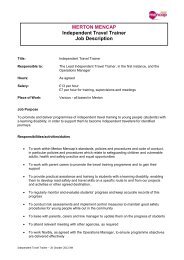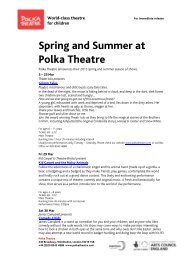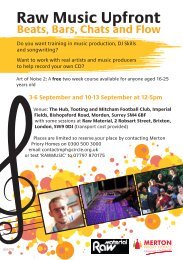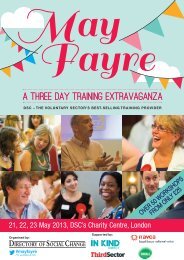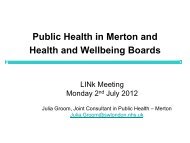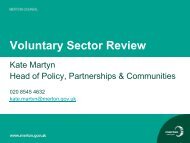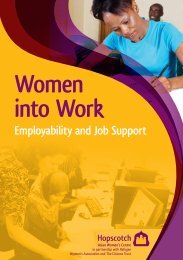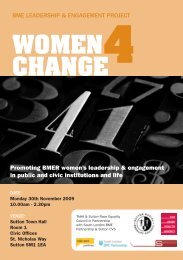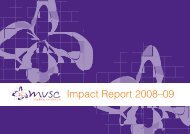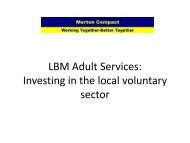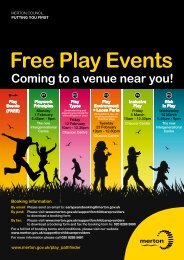Induction & Staff Hand Book (Dudley Youth Service) - Merton ...
Induction & Staff Hand Book (Dudley Youth Service) - Merton ...
Induction & Staff Hand Book (Dudley Youth Service) - Merton ...
You also want an ePaper? Increase the reach of your titles
YUMPU automatically turns print PDFs into web optimized ePapers that Google loves.
Directorate of Children‘s <strong>Service</strong>sThe <strong>Dudley</strong> <strong>Youth</strong> <strong>Service</strong>St James HouseTrinity Road<strong>Dudley</strong>, DY1 1JBYOUTH SERVICEINDUCTION HANDBOOKFor Centre, Detached & Targeted Based Part Time<strong>Staff</strong> and VolunteersThis booklet is designed to help you.It contains useful information to ensure you canwork effectively within theDIRECTORATE OF CHILDREN’S SERVICES<strong>Dudley</strong> <strong>Youth</strong> <strong>Service</strong>St James House,Trinity Road<strong>Dudley</strong>DY1 1JBTel: 01384 815174September 2010401
MISSION STATEMENTVISION 2025Our commitment is to transform the lives of all children andyoung people in <strong>Dudley</strong> by providing a world class education.Over the last few years, <strong>Dudley</strong> Schools have achieved significantimprovements: we now need a step change if we are to fulfil ourambitions of achieving outstanding outcome for all.The Borough‘s Strategic Plan sets out our thinking about how wewill aspire to meet our Children‘s <strong>Service</strong>s motto ‗Putting childrenand young people first in <strong>Dudley</strong>, and our Children‘s Trust vision,‗we want all children and young people in <strong>Dudley</strong> to be happy,healthy and fulfilled‘.Putting learners and learning at the heart of our thinking andplanning we intend that by 2025 all learners in <strong>Dudley</strong> Borough willbe:Ambitious, confident and committed to learningThis is the route to high achievement in an ever changing workTo achieve this, the Borough will provide inspirational learning environmentswhere:1. Young people value and respect themselves and others,whilst contributing positively to the local, national and globalcommunity;2. Young people successfully build on their individual skills andtalents enabling them all to reach their full potential and toenjoy their learning;3. Young people are equipped to use emerging technologiescreatively to enhance their learning;4. Young people are supported to make healthy and safe lifechoices;5. Young people and their families are supported to access excellentlocally provided extended services which supporttheir personal development.2 39
Notes:CONTENTSWelcome to the <strong>Youth</strong> <strong>Service</strong> Team 4—8Procedures / Guidelines 9—14Dealing with Unacceptable Behaviour 15– 16Code of Ethics & Duty of Care 17– 19Administering First Aid 21Damage to Building/Property 21Health & Safety/Security 22-29Training 30Offsite visits/risk assessments 31-32Detached and Outreach 33Lone Working 34Useful Contact Numbers 35References 36Part Time <strong>Youth</strong> Workers <strong>Induction</strong>Monitoring Form 37Mission Statement - Vision 2025 39383
WELCOME TO THE YOUTH SERVICEDear …………………………………..Congratulations on your recent appointment as a ………………………………………………………………... at the ……………………………………………………………………Project within the…………………………………………………………………………..team.<strong>Youth</strong> main roles and duties will be:-………………………………………………………………………………………………………………………………………………………………………………………………………………………………………………………………………………………………………………………………………………………………………………………………………………………………………………………………………………………………………………………………………………………………………………………………………………………………………………………………………………………………..................................................................................This handbook should be sent to you before you start your firstsession, please take the time to read thoroughly . At your firstsession your project leader will take you through the document,highlighting the most important parts, and emphasizing those thatare customised for your project.This is quite a comprehensive document and a lot to take in at first.In order to cover the contents in detail your line manager will arrangefor further induction sessions with you.For paid staff that are new to any Local Authority there is a contractualobligation to under take a probationary period. The standardperiod is for 6 months and your line manager will explain thefull process and the associated paperwork.PART TIME YOUTH WORKERS INDUCTIONDate of appointment<strong>Hand</strong>book received<strong>Induction</strong> Training with ProjectLeaderName of Project ……………………………………………………………………………..Area ……………………………………………………………………………………………………Workers Name …………………………………………………………………………………Signed …………………………………………………………………………………………………Line Manager's Name ……………………………………………………………………..Signed ………………………………………………………………………………………………..Date ....……/...……./...…….Workers Comments....……/...……./...…….....……/...……./...…….....……/...……./...…….http://insidedudley/corporate/info&res/policiesguidanc/personnelpolici/probationary/probationary.doc437
You have been employed at this project for……………………..session(s)per week on the following days/times.Useful Contact NumbersHelp AgenciesDay(s) Arrival Time Departure TimeA large amount of youth work is delivered in collaboration withother agencies.It is also important that youth workers can sign post young peopleto specialist support agencies.Your line manager will list here the onesthat they feel are relevant to your role.Your line manager at this project will be……………………………………………contact number ……………………………….. ………………………...The roles and the names of other staff normally working on yoursession are:-……………………………………………………………………………………………………………………………………………………………………………………………………………………………………………………………………………………………………………………………………………………………………………………635
LONE WORKINGOn no account should you attempt, or be asked to work alonewith a young person or a group of young people.http://insidedudley/education/library/planspoliciesan_/policies_/directorateofch/default.htmYour line manager will issue you with an up to date programme ofthe project, listing all staff associated with it.The administrative assistant for the project is……………………………………………………………………………………………… and theirnormal weekly work pattern is ……………………………………………………………...……………………………………………………………………………………………………………………….You, along with 40 full time staff and over 200 paid and voluntarypart time workers make up <strong>Dudley</strong> <strong>Youth</strong> <strong>Service</strong>. Asa team within the Directorate of Children‘s <strong>Service</strong>s ourmain role is the delivery of informal education in a variety ofsettings with young people.The aim of <strong>Dudley</strong> <strong>Youth</strong> <strong>Service</strong> is to build relationshipswith young people aged 13 to 19 (up to 25 for disabled youngpeople) in order to develop their personal and social skills.We all have a role to play and we hope that the informationcontained in this handbook will help you work more effectivelywith the young people that you engage with. Based onyour experiences and in order to improve our services wehope that you will inform us of how this handbook can be improved.As a service we are aiming to ensure that across the borough,the quality and quantity of service that a young personwould hope to receive at all our projects is of the higheststandard possible.347
However we fully acknowledge that due to a number of contributingfactors our services at different projects are deliveredin various styles.As a worker new to this project it is important that your linemanager has made you fully aware of any policies, practicesand procedures that the are peculiar to your project.There are differences between projects and their individual sessionsfor e.g.What age ranges are they aimed at?Are they are open or closed sessions e.g. particularactivities and/or particular young people?What is the latest times they can gain entry?Is there a re-entry procedure? etcAcquaint yourself with your projects procedures.If at anytime you feel that you require any additional support inorder to undertake your duties, or are uncertain of your responsibilitiesyou must inform your line manager. This can be done informallyor formally. If for any reason you don‘t feel that yourneeds are being met please refer to the Directorate‘s policy forgrievances and disciplinary:-http://insidedudley/corporate/info&res/policiesguidanc_/personnelpolici_/grievancepolicy/default.htmDetached and OutreachThough the majority of our staff are building based, an essentialservice to young people is delivered through our detached team.Each area team has at least one full time detached worker who engagewith young people at venues determined by the young peoplei.e. where they meet. Examples include playing fields, street corners,bus shelters etc. Further details can foundhttp://insidedudley/education/library/planspoliciesan_/policies_/detachedyouthan/default.htmIt is not an uncommon assumption that detached and outreachare the same, they are not. The only similarity is that thework takes place away from an authority's youth centre (seedetached guidelines).<strong>Staff</strong> undertaking outreach will normally be based at one of ourbuildings, but for a variety of reasons they are temporarily unableto meet at these venues e.g.Low numbers attending the centre (recruitment drive)Low numbers attending the centre (fine summerweather)Unable to open the building (Health & Safety)If you do undertake outreach you should follow the basic guidelinesfor detached work.It should be noted that all guidelines mentioned in this handbookand within the wider policies referenced, apply equally to both centrebased and detached youth work.833
<strong>Staff</strong> should NOT use their own car to transport young peoplewithin or out of borough. An approved DMBC list fortaxis companies is available.If exceptional circumstances, agreed by a senior manager,arise then the vehicle used should be approved for traveland subsistence claims and 2 CRB cleared staff should bepresent an the journey.Although not working a 24 hour day, whilst on a residentialstaff should NOT consume alcohol.―employees will refrain from taking any substance, drugs/alcohol, before work, during a break or at lunchtime, suchthat it may effect their judgement or performance at work‖.GENERAL PROCEDURES / GUIDELINESHOURS OF WORKA session equals 3 hours 42 minutes, your time begins themoment you arrive at work until the time you leave thepremises. Included in this time is 3 hours face to facework with young people.It will be virtually impossible for you to work exactly 3hours 42 minutes for each session. Therefore there will betimes that you are either ―in credit‖ or ―in debit‖.Any time owing is accumulated and used by line manager asdirected time to cover for staff meetings, training and anyadditional duties identified by your line-manager. This willensure you have worked the hours contracted by the end ofeach year.If ―in credit‖ any TOIL must be taken within 3 months. Ifnot it is lost.In order that your line manager can monitor your time it isa requirement of your employment, that you complete amonthly timesheet. Timesheets are to be completed at theend of each session.It is an expectation that a working session begins at least15 minutes before opening in order to set up and discussprogramme arrangements and a minimum of 15 minutes debriefat the end of each session.(NB please ensure timesheets are never more than 2 months inarrears. Blank forms are obtainable in your youth project orfrom your line manager.329
SALARYYou will be paid monthly and your salary will be paid directlyinto your account on the last Thursday of every month.If there are any problems with your salary you will need tocontact General Salaries (Finance Department) on 01384814938.SUPERVISIONAll staff regardless of the number of hours worked are entitledto line-management support. This can take the formof staff meetings, as well as one-to-one supervision. In addition,it is compulsory that every member of staff receivesan annual Performance Review and Development Interview(PRD).ANNUAL LEAVEPart time employees receive pro-rata entitlements toAnnual Leave and Bank Holidays.Leave, including concessionary entitlement for full timestaff is 34 days rising to 39 after 5 years‘ service.SessionsWorkedLess than 5years serviceHours/Mins/SecsMore than 5 yearsserviceHours/Mins/SecsBank Holiday &Concessionary(9 days)1 25:09:36 28:51:36 6:39:362 50:19:12 57:43:12 13:19:123 75:28:48 86:34:48 19:58:48TRANSPORT AND OFFSITE VISTS/RISK ASSESSMENTSResidentials, trips and visits are an important part of allyouth work programmes. There will be an expectation thatall staff will at some time be involved these.You need to be aware that in <strong>Dudley</strong> there is an electronicformat for gaining approval to take groups of young peopleoffsite, even if it‘s just to the local parks. On no accountshould you undertake a trip/visit etc without full authorisation.The system is there to protect both young people and staff,safe guarding you all from any possible danger(s).Your line manager needs to acquaint you with the system beforeyou embark on such a venture. Even though you may beinvolved in the planning of the trip, it will be the full timeworkers responsibility to complete the offsite.www.offsitemag.netSome of these visits may involve the use of minibuses. As aservice we no longer have our own, but we do have access tothe corporate fleet based at Lister Road. Many centres alsohave access to buses owned by the local schools.In addition many projects access the minibuses of localschools other agencies and commercial hire. Irrespective ofthe source there are restrictions such as age of drivers, assessmenttests, licence categories etc. Your line managercan advise you on these.1031
TRAININGWe are fortunate in the <strong>Youth</strong> <strong>Service</strong> that in addition to beingable to access both corporate and directorate training opportunitieswe have our own Curriculum Development and Training Officer(Joe Deans).The range of training on offer over the last year has included.<strong>Induction</strong> to <strong>Youth</strong> WorkFirst AidDrugs & Alcohol AwarenessChild ProtectionHealth & SafetyIntroduction to <strong>Youth</strong> WorkAutism AwarenessSexual HealthEqualities and DiversityFood Safety in CateringIntroduction to the Duke of Edinburgh‘s AwardAll leave needs to be booked and authorised in advanceby your line-manager using the relevant form.(NB all leave must be requested at least 2 weeks in advance. Your linemanagerwill assess the request against staff availability prior to authorisation.Special / Unpaid can be considered in certain circumstances.This should be discussed with your line manager in the firstinstance).SICKNESS ABSENCEIf not attending work due to illness please ensure you havenotified your line-manager or administrative assistant before12 o‘clock midday. In extenuating circumstances theline manger/team leader must be contacted as soon aspossible preferably no less than 2 hours.In addition to the borough wide training;Opportunities also arise at area and unit levels.Your training needs will be identified during your annual PerformanceReview Development Interview; team meetings and oneto one supervisory session with your line manager3011
It is important to familiarise yourself with thebuildingFind and make a note of the location of the following :TELEPHONE:………………………………………………………………………………….FIRST AID KIT AND ACCIDENT BOOK/FORMS:-……………………………………………………………………………………………………………..FIRE ALARM: ……………………………………………………………………………….FIRE EXITS: ………………………………………………………………………………..FIRE EXTINGUISHERS: …………………………………………………………..ELECTRICITY FUSE BOXES: ………………………………………………….SWITCH FOR MAINS SUPPLY: ……………………………………………..HEATING SWITCH & CONTROLS: ……………………………………..CLEANING MATERIALS: ………………………………………………………….GAS & ELECTRICITY METERS: ……………………………………………..WHO REPORTS BROKEN WINDOWS& GENERAL REPAIRS? …………………………………………………………………KEY SAFE ………………………………………………………………………………………..12 29
HEALTH & SAFETY PROCEDURESWill you have a set of keys to the building?YES / NOWill you know the combination for the Night Safe?YES / NODo you know the alarm code?YES / NOWho do you contact if and when the intruder alarm is activated?Name : ………………………………………………………………………………………….Tel : ……………………………………………………………………………………………...Do you know how to operate the Fire Alarm?YES / NOAre you aware that a copy of the Child Protection Proceduresis available in the office?YES / NOAre you aware of the Data Protection Policy?Are you aware of the Incident ManagementPlan?YES / NOYES/NORemember that if you do not provide adequate time forcover to be identified the project‘s session may have tobe cancelled.If absent for longer than 7 days, you are required toprovide a Doctor‘s note. Lesser absence requires a selfcertificationnote (pink form available within your centreor from your line manager).All absence details are kept on the ‗Leave Card‘ and maybe referred to at a later date.LATENESSIf, for whatever reason, you know that you will be late,you again need to contact your line manager and or sessioncolleagues as soon as possible.OTHER ABSENCEOccasionally there may be a reason why you are not ableto attend work. It may be possible to swap a session witha colleague and/or to make up the time somewhere else ortake the time off as annual leave or unpaid leave. Howeveryou need to discuss this with your line manager in thefirst instance.COMMPASSIONATE LEAVEAs an employee you are eligible for compassionate leave.Further details can be found on:-http://insidedudley/corporate/info&res/policiesguidanc_/personnelpolici_/compassionatede/default.htmThe department can use discretion to allow time off tocare for dependants in an emergency or unforeseen circumstances.2813
MATERNITY LEAVE/PATERNITY LEAVEMaternity leave arrangements form part of your conditionof service. A booklet is available on requestfrom Children's <strong>Service</strong>s Personnel.Parental Leave — With effect from 6th April 2003,fathers have been eligible for 2 weeks paid paternityleave, providing they meet the criteria. However one ofthese weeks may be taken as Maternity Support Leave andwill therefore attract full pay. Details can be found on:-http://insidedudley/corporate/info&res/policiesguidanc_/personnelpolici_/maternityfinala/default.htmPROJECT CLOSUREA project will generally close for Bank Holidays(Annual Leave). When closures are as a result of staffshortages, staff will (where possible) be redirected toanother venue. This will be resolved in negotiationwith the line-manager.If you fail to turn up for work this could result in thesession being cancelled.SESSIONAL RECORDING SHEETSRecording sheets should be correctly completed in fullat the end of each session. Sheets must be completedirrespective of whether the centre is open or closed.ID BADGE PROCEDUREYou must have, and display, a current identity badge.This shows you are a bona-fide council employee. Askyour line manager to make the necessary arrangementsfor you to be photographed and the badge to be issued.All equipment used must be checked and secured awaysafely. This includes any finance and personal records.Check with your line manager if there is an expectation thatyou will have to undertake any of the cashing up procedures.If so be familiar with how your project undertakes this.All windows and secondary entrances/exits need to beclosed and secured.All rooms and store cupboards need to be checked to ensurethat young people are not hiding before they are finallylocked.Any damage should be noted and recorded.Any contribution to the cleaning and tidying of the premiseswill be appreciated by the day staff. The senior worker willadvise as to what is an acceptable standard.The final setting of the alarm and the locking of the frontdoor should not be left to just one worker. Complicationscould arise with both and your colleagues(s) would appreciateyour company and support. It is good practice and anindication of a strong team if all of you leave at the sametime. Your full time worker will advise you on the proceduresto follow if this rare scenario should arise.If you drive to work, the young people especially on cold andrainy nights, may try to coherce you into giving lifts. On noaccount should you provide this.1427
As a service we would encourage healthy eating cookery projects.Any involvement with the preparation of food will require someform of training. This can be made available through our trainingprogramme.PHYSICAL ACTIVITIESPhysical activity is an important aspect in the programme of mostprojects and young people should be encouraged to participate.In most cases the activities are informal and we would hope thatall staff would feel comfortable in organising and officiating suchsessions. However we would advise staff not to participate inactivities that could involve any physical contact with young people.If there is to be any element of coaching instructing or teachingyou, and the full time worker, need to undertake an assessment ofyour capabilities, qualifications and experience before this can beundertaken,. If it is felt that young people may be at risk of injuryyou should not lead such a session without the necessaryqualification(s).As a service we can signpost you to sources of such qualificationsand in some cases support you in acquiring them.END OF THE SESSIONYour session does not finish when the young people have left.There are other commitments within your allotted time.All necessary paperwork such as observations, financialtransactions, recordings and timesheets should be completed.DEALING WITH UNACCEPTABLEBEHAVIOUREach centre should set up it‘s own ground rules with themembers on dealing with unacceptable behaviour. Theseshould be reviewed on an annual basis.The agreed ground rules on unacceptable behaviourshould be displayed on the notice board of all centres.You need to be fully acquainted with these.All those that attend the project need to be aware ofwhat the consequences will be for them if they breachthe ground rules.There needs to be agreement within the projects staffteam as to who is responsible for administering any disciplinarymeasures e.g. any member of staff, leader incharge only etc.If at anytime you disagree with the level of punishmentyou should not challenge a colleague in front of theyoung people. Wait until the end of the session to discussthe event calmly.If in the event you or colleagues feel verbally or physicallythreatened you should not respond with similar actions.Remain calm, ensure that all the staff are awareof the situation and attempt to isolate the incident fromthe rest of the project and its members.If during a centre session an incident occurs when theseground rules are breached an incident report form2615
should be completed and brought to the attention of theArea <strong>Youth</strong> Worker.Any physical contact with a young person could be interpretedas an assault and “physical restraint” is a term notused in the youth work vocabulary.If in the very rare event you have to physically intervene itshould be as a very last resort and to avoid any furtherphysical violence.If the behaviour is of an criminal nature the involvement ofthe police may need to be considered. The project shouldhave a procedure as to who makes this decision. Don‘t bescared of involving the police but remember that you are notobliged, unless asked, to inform them of any criminal behaviour.If you suspect any of the young people to be in possession ofanything illegal you have no right to search them, this toocould be regarded as an assault .If a serious incident occurs your Area <strong>Youth</strong> Team Leadershould be notified immediately.When removing/returning equipment to secure cupboardsensure that the open doors are never left unattended.If a young person asks you to look after an ―expensive‖ personalitem or money do not keep it on your person, lock itaway in a safe and secure location. Ideally issue a receipt ornote it in the diary and get the action witnessed. A similarprocedure should be operated on its return to the youngperson.Most, if not all projects, will have their own or access topetty cash. If you have to purchase material or resourcesto assist your work this is where the cash should be sourcedfrom.On no account should you access monies from subscriptionsor coffee bar takings. Before purchasing any items checkwith your line manager thatThe materials are suitableThe project hasn‘t already got these itemsThe money will be availableYou will, of course, have to provide receipts for all your purchases.COFFEE BARMost of our projects will have some form of coffee bar facility,but not always open all the session, familiarise yourself with theproject‘s procedure:Opening timesStock control methodsWho has responsibility for servingAre the young people authorised to serve, if so who?1625
EQUIPMENTProjects should have some form of system in place for theloan of equipment and consequences for any damage. Whatis at your project?Similarly what procedure is in place for young people to gainaccess to facilities such as pool tables, the gym, table tennistables etc?CASH AND VALUABLESWhether it is genuine or a ploy you will come across youngpeople that say that they don‘t have their subs or depositmoney. What is the project‘s stance on this?On no account and for whatever reason should you lendyoung people money. Refer these matters to the seniorworker on duty.We would hope that all the young people we work with aretrustworthy, however we have a duty of care not to puttemptation in their way.Ensure that staff belongings are safely locked away in anarea that is not accessed by young people.Don‘t leave any keys hanging around.Make certain that all cash, yours or the projects is notleft unattended.Do not use any combination code e.g. safe or alarms inthe presence of young people. (similarly never writethem down).CODE OF ETHICS AND DUTY OF CAREGENERAL BEHAVIOURThe project‘s ground rules are for both the young people andthe staff. At all times staff are expected to provide anddisplay positive images for the young people.<strong>Youth</strong> Workers must not be seen to condone or support anyactivity detrimental to the health and well being of youngpeople.SMOKING<strong>Dudley</strong> MBC operates a No Smoking Policy in all of its buildings,this applies to all staff, adult visitors and young people.http://insidedudley/corporate/info&res/policiesguidanc_/personnelpolici_/smokefreedudley/default.htm<strong>Youth</strong> Workers must not under any circumstances give youngpeople cigarettes and should never smoke in their presence.<strong>Staff</strong> are reminded that <strong>Dudley</strong> Council prohibits employeesfrom smoke breaks during work time. During unpaid lunchbreaks and arriving and departing a session, staff who wishto smoke must remember to be a minimum of 15 metres fromentrances and exits of any council building.DRUGS / ALCOHOLAs with the above, the stance on this issue is that it wouldbe unacceptable for a <strong>Youth</strong> Worker to be under the influenceof drugs / alcohol whilst carrying out their duties andwhilst in the presence of young people. <strong>Youth</strong> Workersshould be aware that such actions would be viewed as misconductand therefore constitute the need for disciplinaryprocedures.2417
<strong>Staff</strong> should be aware that behaviour in their personal lives,including the misuse of drugs and alcohol, may impact upontheir suitability to work with young peopleAll projects should have a policy regarding substance abuse (itmay be part of the general ground rules). All staff need tobe aware of its contents.<strong>Youth</strong> Workers must make informed decisions about workingwith young people that appear to be under the influence ofdrugs/alcohol. A risk assessment should be made taking intoconsideration factors such as numbers, personal safety andthe environment. All decisions should be recorded as part ofthe sessional records.http://insidedudley/corporate/info&res/policiesguidanc_/personnelpolici_/substanceabusep/default.htmGifts, Rewards and favoritismThere are occasions when young people are ‗rewarded for their involvementin the service and/or prize winners. <strong>Staff</strong> should alwaysbe able to justify criteria and decision making.<strong>Staff</strong> should not give individual personal gifts to young peopleunless discussed, agreed and recorded by their line manager.<strong>Staff</strong> should avoid working directly with their own child and/orclose relatives. This relates to both perceived conflict and potentialto impair judgment or performance.Where staff children and/or close relatives express interest in additionalactivities which could be seen as rewards, staff should seekagreement of the line manager (senior manager, if relating to a fulltime worker) prior to the young person being booked onto theactivity.rooms and store cupboards. Check this out at you place ofwork.On no account should you be in a room unaccompanied with ayoung person.When working with a small group there should, ideally, be 2staff present, but realistically not always possible. In thiscase the room should have a internal window where colleaguescan view you, the door must remain open at all times,colleagues need to know where you are and they need to bewithin a reasonable audible distance to yourself.CONFIDENTIALITYIf a young person requests to speak to you on a one-to-onebasis you need to make the senior worker on duty aware andfollow the same guidelines as with small groups.If you believe that there is a confidentiality issue the youngperson needs to be aware that you cannot guarantee this(e.g. child protection). If this is the case the young personneeds to know what the consequences could be and thecourses of action you may have to take if they divulge informationthat you have to report/inform to others.Seek and take advice from more experienced staff and yourline manager on the protocols and procedures to follow.It is not uncommon for building based projects to attractgroups of young people who, for a variety of reasons, do notor cannot gain access . What is the policy at your projectfor engaging with these young people?1823
HEALTH & SAFETY/SECURITYSTAFF RATIOSAs a service we are not prescriptive about staff ratios toactivities. As the experts with their own young people, individualprojects will assess and decide on what is safe.However, no session will operate without at least 2 membersof staff being present.Subsequently you need to know what course of action youshould follow if not enough staff are present.For a mixed gender session there should, ideally, be a balanceof male and female staff. Failure to do so will not, byitself, be a reason not to open.RISK ASSESSMENTBefore allowing young people onto the premises all staffhave a corporate responsibility to ensure that a Health &Safety risk assessment has been undertaken of both thepremises and equipment. Anything that may be of danger toboth staff or young people needs either to be removed, isolatedor repaired and actions recorded.USE OF ROOMSMany of the projects have a number of rooms, but it wouldbe rare for all to be used at the same time. You need to beaware of the protocol at your project for rooms to beunlocked.Depending on the level of trust with the young people someprojects may have a protocol for them to open and lock22CONFIDENTIALITYAll staff must be made aware that under no circumstancesshould the personal addresses and telephonenumbers of employees/young people are given out toanyone.Each project will have the personal details of all itsyoung people. All staff have the responsibility to ensurethat any documentation referring to their membersis not on view to others and is securely lockedaway when not in use.While we would encourage all staff to be open and honestin their relationships with young people we wouldadvise adults NOT to share any personal informationwith a young person.EQUAL OPPORTUNITIESAt all projects Equal Opportunities are fully promotedand bullying in any form is not tolerated. Check outyour project‘s statements, policies and procedures onthese matters.ADULT VISITORSOccasionally your project may be visited by an adult, ifso they should be politely challenged, and asked to provideofficial identification as to who they are and whythey are on the premises. If they fail to do so thenask them to wait by the front door and alert theproject‘s senior worker to this fact.We regard the police as colleagues and if they visitthey should be welcomed into the premises. If theyare on official business please do not obstruct or hinderthem in anyway.19
CHILD PROTECTIONIf either directly or indirectly you are made awarethat a young person‘s safety may be at risk you needto immediately alert the senior worker on duty of yourevidence or suspicions. This risk does not necessarilyhave to be at the project, it includes the home, schoolor college.Unless you have been recently trained in child protectionyou should not attempt to deal with such incidents.Each project will have at least one designatedmember of staff, they will deal with the reporting andrecording and assist you in supporting the young person.The authority have policies covering this matterand training for all staff is on offer.http://insidedudley/education/library/planspoliciesan_/policies_/childprotection/default.htmCOMMON ASSESSMENT FRAMEWORKThe CAF is a shared assessment tool for use acrossall Children‘s <strong>Service</strong>s. It aims to help early identifycation of need and promote coordinated service provision.Your line manager can provide you with furtherinformation and training opportunities regarding CAF.ADMINISTERING FIRST AIDIdeally, a fully qualified First Aider should be availablewhen the centre is open. This can be made availablethrough our training programme.In the event of an accident, the appointed First Aidershould assess the situation and administer the appropriatefirst aid. If the first aider believes that hospital treatmentis required they should notify the parent / carers immediately.For their own safety and security any member of staffadministering first aid should have a colleague presentin order to witness any actions.Assessing the situation includes checking the personaldetails of the individual that are held by the project.Workers need to be aware of certain conditions or allergiesbefore treating the casualty.On no account unless the accident is life threatening,should staff supply or give young people medication,even an aspirin for headaches.Any accident, however minor, should be recorded as perthe Council policy in the accident book and noted on theSessional Recording Sheet.DAMAGEAny damage to buildings or property should be reported to yourLine Manager and logged in the Day <strong>Book</strong> (diary). If damage iscaused to the building and repairs are required to secure thebuilding to make it safe out of normal office hours then theEmergency service should be contacted (01384 818182).2021


